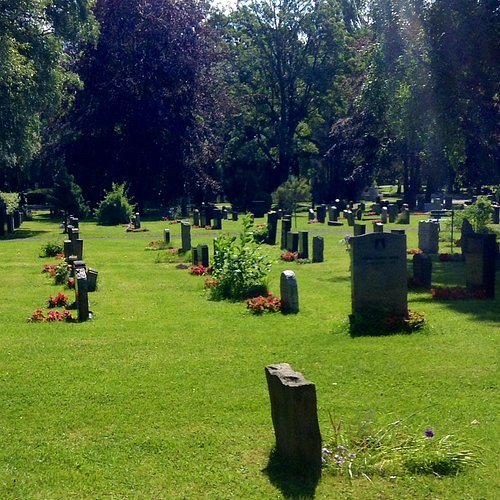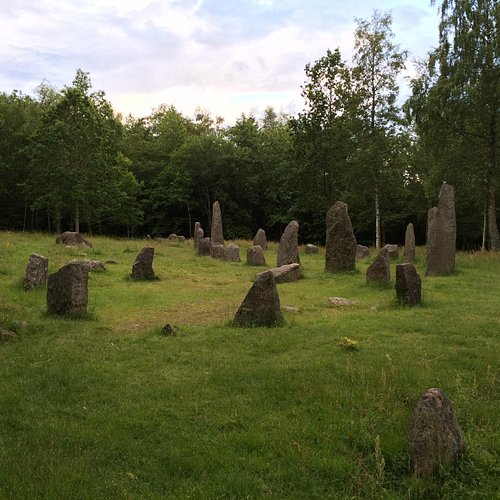Top 8 Cemeteries in Eastern Norway, Eastern Norway
Discover the best top things to do in Eastern Norway, Norway including Vestre Gravlund, Istrehagan Burial Ground, Ostre Gravlund, Our Saviour's Memorial Cemetery, Fredrikstad Military Cemetery, Oseberghaugen Royal Mound, Burial Mounds at Huseby, Burial Mound at Lerhol.
Restaurants in Eastern Norway
1. Vestre Gravlund
Overall Ratings
4.5 based on 17 reviews
The cemetery and chapel were inagurated in 1902. Naturally laid out urn graves with stone settings from 1939. In connection with the cemetery is Vestre Krematorium (Western Crematorium). The city's largest war memorial is situated here - the final home of 331 Soviet, 102 British, Danish, Jugoslavian, Polish, Swedish and Norwegian inhabitants. The cemetery office is open on weekdays 8 am-3 pm.
Reviewed By laszlob939 - Oslo, Norway
A typical Norwegian cemetery. While in some countries the tombs are enormous marble constructions, like the tombs of some Egyptian pharaos, the Norwegian stones are usually never larger than 1 meter high. You have the choice of caring the grave self or pay for professional care. A neat cemetery if you are in the mood of visiting cemeteries.
2. Istrehagan Burial Ground
Overall Ratings
4.0 based on 15 reviews
Istrehagan is a burial ground from the early age of migration, with 5 stone settings from around 400-600 AD. Remains from persons, beer's paws, china, a needle and other grave gifts are found at Jaberg in Tjolling. The cultural monument Istrehagan consists of five stone settings and two ship settings. The biggest one is 25 metres long and consists of 18 single erect stones. Archeological excavations were undertaken in the early 1960s, and the restored burial ground is considered as one of the best preserved cultural monuments of its kind. Discoveries nearby indicate that there were settlements in this area as early as the Stone Age and the Bronze Age.
3. Ostre Gravlund
Overall Ratings
4.0 based on 4 reviews
The cemetery was inaugurated in 1895 and has been enlarged several times, especially in the 1920s and 1930s, when it became richly vegetated with lovely floral designs. The urn yard dates back to 1936. ostre gravlund is the main cemetery for Oslo's Jewish community.
4. Our Saviour's Memorial Cemetery
Overall Ratings
4.0 based on 31 reviews
Replaced Oslo Cathedral's cemetary in 1808. aereslunden (The honorary cemetary) was established in 1904. Famous Norwegians such as Edvard Munch, Henrik Ibsen, Henrik Wergeland, Bjornstjerne Bjornson, Richard Nordrak, Christian Krogh and Alf Proysen are buried here.
5. Fredrikstad Military Cemetery
6. Oseberghaugen Royal Mound
Overall Ratings
3.5 based on 17 reviews
Queen's grave. Archaeological excavations in 1904 uncovered history's largest and richest example of craftmanship from the Viking Ages. The beautiful 21,5 m long Oseberg ship, Oseberg carriage, five beautifully carved bed-posts shaped like animal heads, four sledges, beds, chests, weaving-frames, household utensils and much more. For a long time it was thought that this was the grave of Queen asa, grandmother of King Harald Hairfair. Scientific examinations in 1992 now date the buriel to 834 AD, and indicate that it is Queen Alvhild, who was the first wife of King Gudrod, who lies buried here. The barrow, 40 m in diameter, was restored in 1947. A newly opened path along the Velle creek has posts which inform of the excavation. A copy of the beautifully carved bow of the ship can be seen in front of the Vestfold County Museum. Buss no. 113 from the Central Buss Station to Klokkerasen school.
7. Burial Mounds at Huseby
The two burial mounds at Huseby is from the late Iron Age and is Norway's largest burial mounds. They are about 5 feet high and measuring between 28-36 feet in diameter. The legend tells that Sanct Hallvard (d. ca 1043 AD.) is to be buried in the northern hill, after having been in one of the hills on Frydenlund.
8. Burial Mound at Lerhol
On Lerhol in Vang is a burial mound dated about 400 AD. Vang differs from the other Valdres councils because of its strong influences from the west in Merovingian Viking Age. Here we find the typical tombs from the western part of Norway.






